 Petzlover
Petzlover Canaan Dog is originated from Israel but Newfoundland Dog is originated from Canada. Canaan Dog may grow 13 cm / 5 inches shorter than Newfoundland Dog. Canaan Dog may weigh 55 kg / 121 pounds lesser than Newfoundland Dog. Canaan Dog may live 5 years more than Newfoundland Dog. Canaan Dog may have less litter size than Newfoundland Dog. Canaan Dog requires Low Maintenance. But Newfoundland Dog requires Moderate Maintenance
Canaan Dog is originated from Israel but Newfoundland Dog is originated from Canada. Canaan Dog may grow 13 cm / 5 inches shorter than Newfoundland Dog. Canaan Dog may weigh 55 kg / 121 pounds lesser than Newfoundland Dog. Canaan Dog may live 5 years more than Newfoundland Dog. Canaan Dog may have less litter size than Newfoundland Dog. Canaan Dog requires Low Maintenance. But Newfoundland Dog requires Moderate Maintenance
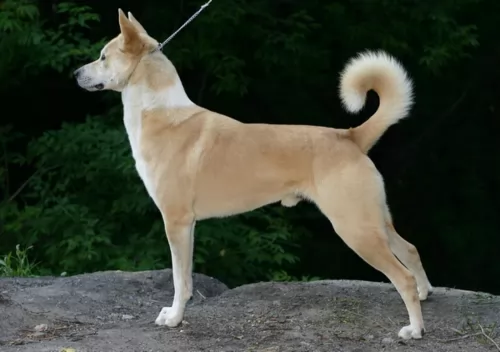 The Canaan Dog is an attractive dog and is Israel’s national breed. Research reveals that the dog’s history can be traced way back to 2200BC.
The Canaan Dog is an attractive dog and is Israel’s national breed. Research reveals that the dog’s history can be traced way back to 2200BC.
The dog’s origins go back to the pariah dog of the Middle East. It is believed that the dog has been perceived as a sacred animal and that he was both guard- and herd dog of the ancient Israelites.
A certain Dr Rudolphina Menzel moved from Vienna to Israel and was asked to establish a service dog organization. She trained and bred them, finding them to be highly trainable. She began a breeding program in 1934, providing working dogs for the military and starting a selective breeding program for the Canaan dog. The Israel Kennel Club dog recognized the Canaan for the first time in 1953.
 The Newfoundland dog is a large working dog. They were bred and used as a working dog for fishermen in the Dominion of Newfoundland, an eastern province of Canada. With their web feet they were also used for water rescue.
The Newfoundland dog is a large working dog. They were bred and used as a working dog for fishermen in the Dominion of Newfoundland, an eastern province of Canada. With their web feet they were also used for water rescue.
The history of the Newfoundland Dog is unsure, but the breed as we know it today originated from dogs which were brought from Newfoundland to England in the early 1800's.
The Newfoundland Club was founded in 1886 so as to promote the breed.
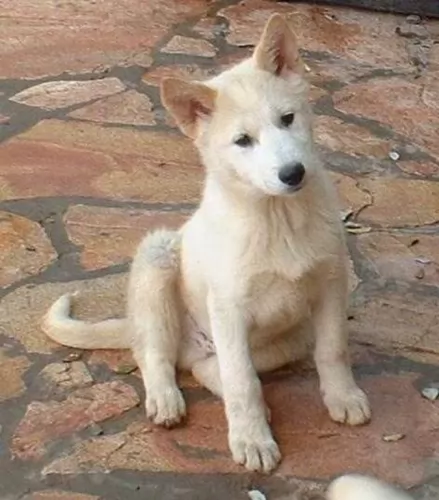 The Canaan Dog is lean, standing at between 51–61cm and weighing roughly 18-25kg. The medium sized Canaan Dog’s coat is medium length and can be sandy to brown, white or black or a mix of these. The eyes are dark and inquisitive, the ears are erect and the high set bushy tail is curled over the back.
The Canaan Dog is lean, standing at between 51–61cm and weighing roughly 18-25kg. The medium sized Canaan Dog’s coat is medium length and can be sandy to brown, white or black or a mix of these. The eyes are dark and inquisitive, the ears are erect and the high set bushy tail is curled over the back.
The Canaan Dog is alert, intelligent, confident and territorial. They are wary of strangers and because they’re alert they’re constantly aware of movement, making them a superb watchdog. However, the dog isn’t aggressive and he makes an excellent family pet, even around children and other pets.
He will need training and socialization though to make him obedient and amicable. He is a strong-willed dog. He is co-operative when being trained and responds well. They are energetic and will make a good companion for runners and cyclists.
 The Newfoundland is a large dog standing at between 63cm to 74cm, both male and female. Weight can vary from 45kg to 80kg.
The Newfoundland is a large dog standing at between 63cm to 74cm, both male and female. Weight can vary from 45kg to 80kg.
He has a double coat of medium-length straight hair and the hair can be black, brown or gray. Although it is common for the Newfoundland to have a solid-colored coats, you will sometimes find small patches of white on their chest, toes, or at the tip of the tail. Then again you get the less common Newfoundlands where the coat is white with some black markings and these are known as Landseers.
The outer coat is coarse, oily and water-resistant quality, suited to a dog that loves to spend time in the water. The head is broad and large with small ears that he keeps lying close to his head. The tail is long and plumed and the feet are wide with webbing between the toes which aids him with swimming.
As with many large dogs, the Newfoundland is docile and his sheer size makes it that he is best suited to life in the countryside as opposed to living in the city. This is also because this particular dog wants to be close to water where he can swim.
He is a trustworthy, loyal dog and will get on well with children and pets in the home. Training and socialization is always recommended for any dog, but a big dog can often ‘get in the way’ indoors and you want him to lie down or sit when you tell him to. He is an intelligent dog so will respond well to training.
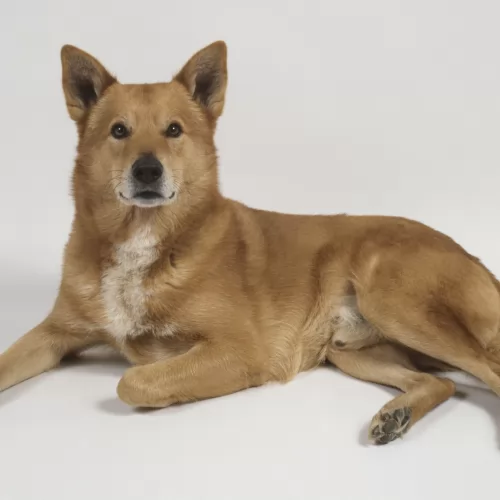 The Canaan Dog is an intelligent dog and this makes him easy to train. He is a strong-willed, independent dog and will require training and socialization to make him obedient. He is an affectionate and loving dog and will make a wonderful family pet.
The Canaan Dog is an intelligent dog and this makes him easy to train. He is a strong-willed, independent dog and will require training and socialization to make him obedient. He is an affectionate and loving dog and will make a wonderful family pet.
The Canaan Dog is also a fairly healthy, robust breed and appeals to many dog owners who don’t have to spend money on professional grooming for him. He doesn’t require much – isn’t high maintenance at all and he is just waiting to become a member of a human family where he can be loved and cared for just like any other family member.
 Your beautiful, cuddly puppy will soon become a giant dog with a big appetite. Don’t just buy a cute puppy if you can’t afford to feed him properly and you can’t give him lots of attention.
Your beautiful, cuddly puppy will soon become a giant dog with a big appetite. Don’t just buy a cute puppy if you can’t afford to feed him properly and you can’t give him lots of attention.
Your dog will also be shedding, so be aware of these aspects before you bring a large Newfoundland into your home. He is a gentle dog, but his size could be worrisome if he isn’t trained, socialized and supervised.
Newfoundlands are amicable dogs, and while he may like to spend times indoors with you relaxing, he is a working dog and will require exercise and activities for mind and body.
Give this giant of a dog a loving home, and you will have a special, devoted friend like no other.
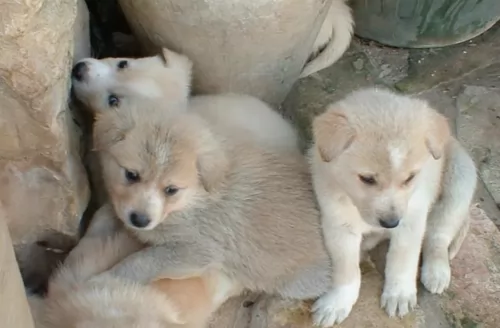 The Canaan Dog has a strong immune system and with good care from his owner he can reach 15 years of age. He has been used to living in harsh conditions in the deserts of Israel.
The Canaan Dog has a strong immune system and with good care from his owner he can reach 15 years of age. He has been used to living in harsh conditions in the deserts of Israel.
If you want to buy a Canaan dog, as with any dog, a good breeder will be able to produce health certificates for the puppy's parents. These certificates confirm that the dog has been tested and cleared of certain common conditions that affect dogs.
Because hip dysplasia is such a common problem with dogs, you may want to see health certificates from the Orthopedic Foundation for Animals (OCA).
A form of cancer that you might expect to see in this breed is Lymphosarcoma, a cancer which affects the lymphoid system. The lymphoid system is a critical part of the dog’s immune system to fight off viruses and bacteria.
 The Newfoundland can be prone to serious health conditions such as hip dysplasia and gastric torsion. Deep chested dog breeds like the New Foundland are susceptible to bloat, a life threatening condition where the stomach swells, it can twist and the dog can die if help isn’t available. He will be salivating, restless and whining while also trying to vomit.
The Newfoundland can be prone to serious health conditions such as hip dysplasia and gastric torsion. Deep chested dog breeds like the New Foundland are susceptible to bloat, a life threatening condition where the stomach swells, it can twist and the dog can die if help isn’t available. He will be salivating, restless and whining while also trying to vomit.
Giant breeds are also prone to elbow and hip dysplasia, a genetic problem which can ultimately affect your dog’s mobility.
When in any doubt about your pet’s health, get him to the vet.
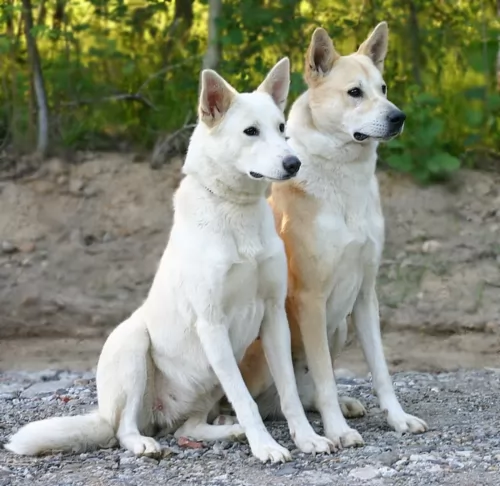 The Canaan Dog needs a steady diet of high-quality food, whether you provide your own home-made food or you buy commercially manufactured food. A healthy diet full of minerals and vitamins is essential for good health. If you’re not sure how to feed your Canaan dog, your veterinarian can advise you according to your dog’s age.
The Canaan Dog needs a steady diet of high-quality food, whether you provide your own home-made food or you buy commercially manufactured food. A healthy diet full of minerals and vitamins is essential for good health. If you’re not sure how to feed your Canaan dog, your veterinarian can advise you according to your dog’s age.
Remember that dogs are carnivorous so even though raw meat can be pretty expensive, you want to include it in his diet from time to time to stave off itchy, dry skin rashes and other illnesses. Always see to it that there is a bowl of fresh, cool water 24/7.
The Canaan Dog is a low maintenance breed who has moderate, seasonal shedding. The coat is easy to groom. He will need a good brush twice a week to keep him free of loose hairs and to keep his coat shiny.
Other kinds of grooming are also important such as brushing his teeth 2 or 3x a week to remove tartar build-up. Bad teeth can affect the immune system and make him ill.
Canaans are going to require a moderate amount of exercise. Just like with any dog, you can’t just buy a cute puppy and when he becomes an adult and no longer cute to you, forget about him in the backyard. A dog is a 15 year responsibility and he will need regular walks and games from you to guarantee his health and happiness.
 Your dog’s coat will need to be brushed at least twice a week as he is a heavy shedder.
Your dog’s coat will need to be brushed at least twice a week as he is a heavy shedder.
Do the nails of your dog as soon as they start getting long. Long nails can hook on things and cause injury to the dog’s paw area.
This is a dog with floppy ears so check inside the ears to prevent ear infections, more so because this is a water-loving dog. The dampness inside the ears can cause bacteria.
This is a giant breed and sadly, they have the shortest lifespans. You want to make sure that you keep your giant breed as healthy as possible to ensure he reaches the 10 or so years allotted to him and to also prevent health problems.
Make sure your giant breed puppy and adult has the very highest quality commercially manufactured food to ensure he gets the right balance of nutrients in. This food also makes sure that your puppy rather grows at a slower rate and stronger as opposed to growing too quickly. Rapid growth comes with joint problems.
All dogs, large and small, don’t want exotic, strange food that upsets their stomachs. They want consistency and simplicity and they want tasty food. Give him some homemade food such as cooked chicken, brown rice or pasta and some vegetables such as sweet potato, carrots and spinach. You can add this occasionally to his dry kibble.
Add in some raw meat from time to time too. Your pet will be strong, healthy, happy and content.